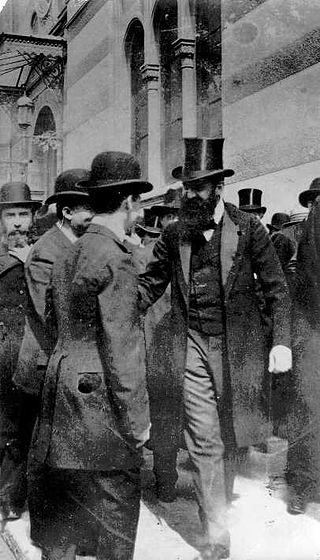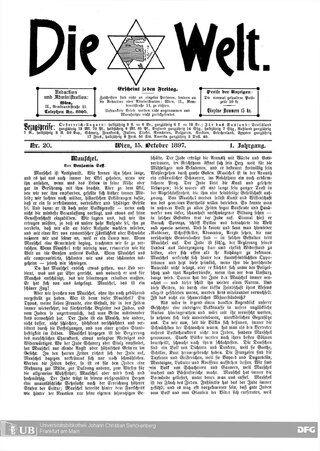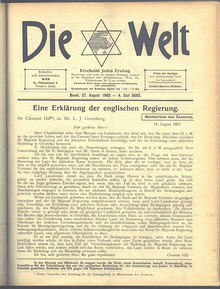
Max Simon Nordau was a Zionist leader, physician, author, and social critic.

Asher Zvi Hirsch Ginsberg, primarily known by his Hebrew name and pen name Ahad Ha'am, was a Hebrew journalist and essayist, and one of the foremost pre-state Zionist thinkers. He is known as the founder of cultural Zionism. With his vision of a Jewish "spiritual center" in Eretz Israel, his views regarding the purpose of a Jewish state contrasted with those of prominent figures within the Zionist movement such as Theodor Herzl, the founder of political Zionism. Unlike Herzl, Ahad Ha'am strived for "a Jewish state and not merely a state of Jews".

The World Zionist Organization, or WZO, is a non-governmental organization that promotes Zionism. It was founded as the Zionist Organization at the initiative of Theodor Herzl at the First Zionist Congress, which took place in August 1897 in Basel, Switzerland. The goals of the Zionist movement were set out in the Basel Program.

Nathan Birnbaum was an Austrian writer and journalist, Jewish thinker and nationalist. His life had three main phases, representing a progression in his thinking: a Zionist phase ; a Jewish cultural autonomy phase, which included the promotion of the Yiddish language; and a religious phase, when he turned to Orthodox Judaism and became staunchly anti-Zionist.

Cultural Zionism is a strain of Zionism that focused on creating a center in historic Palestine with its own secular Jewish culture and national history, including language and historical roots, rather than other Zionist ideas such as Political Zionism. The founder of Cultural Zionism is Asher Ginsberg, better known as Ahad Ha'am. With his secular vision of a Jewish "spiritual center" in Eretz Israel/Palestine, he confronted Theodor Herzl. Unlike Herzl, the founder of political Zionism, Ha'am strove for "a Jewish state and not merely a state of Jews".

Theodor Herzl was an Austro-Hungarian Jewish journalist, lawyer, writer, playwright and political activist who was the father of modern political Zionism. Herzl formed the Zionist Organization and promoted Jewish immigration to Palestine in an effort to form a Jewish state. Due to his Zionist work, he is known in Hebrew as Chozeh HaMedinah, lit. 'Visionary of the State'. He is specifically mentioned in the Israeli Declaration of Independence and is officially referred to as "the spiritual father of the Jewish State".

The First Zionist Congress was the inaugural congress of the Zionist Organization (ZO) held in the Stadtcasino Basel in the city of Basel on August 29–31, 1897. Two hundred and eight delegates and 26 press correspondents attended the event. It was convened and chaired by Theodor Herzl, the founder of the modern Zionism movement. The Congress formulated a Zionist platform, known as the Basel program, and founded the Zionist Organization.

Leo Motzkin was a Ukrainian Zionist leader. A leader of the World Zionist Congress and numerous Jewish and Zionist organizations, Motzkin was a key organizer of the Jewish delegation to the 1919 Paris Peace Conference and one of the first Jewish leaders to organize opposition to the Nazi Party in Germany.
The negation of the Diaspora is a central assumption in many currents of Zionism. The concept encourages the dedication to Zionism and it is used to justify the denial of the feasibility of Jewish emancipation in the Diaspora, arguing that Diasporic life leads either to discrimination and persecution or Jewish national decadence and assimilation. A more moderate formulation says that the Jews as a people have no future without a "spiritual center" in the Land of Israel.

The common definition of Zionism was principally the endorsement of the Jewish people to establish a Jewish national home in Palestine, secondarily the claim that due to a lack of self-determination, this territory must be re-established as a Jewish state. Historically, the establishment of a Jewish state has been understood in the Zionist mainstream as establishing and maintaining a Jewish majority. Zionism was produced by various philosophers representing different approaches concerning the objective and path that Zionism should follow. A "Zionist consensus" commonly refers to an ideological umbrella typically attributed to two main factors: a shared tragic history, and the common threat posed by Israel's neighboring enemies.

William Henry Hechler was an English Restorationist Anglican clergyman; eschatological writer; crusader against antisemitism; promoter of Zionism; and aide, counselor, friend and legitimiser of Theodor Herzl, the founder of modern Zionism.

Yossi Goldstein is an Israeli historian and biographer. Goldstein's research focuses on Modern Jewish History, the History of Zionism, and the History of the State of Israel. Goldstein is a professor at the Faculty of the Social Sciences and the Humanities at the Ariel University Center. He has published biographies of Eli Horovitz, Levi Eshkol, Yitzhak Rabin and Golda Meir.

Golus nationalism, or diaspora nationalism, is a national movement of the Jewish people that argues for furthering Jewish national and cultural life in centers of large Jewish communities throughout the world while simultaneously seeking recognition for a Jewish national identity from world powers. The term golus has been understood to mean both "diaspora" and "exile."

The Second World Zionist Congress met in Basel, Switzerland on 28 August 1898. and was the second meeting of the Zionist Organisation. The World Zionist Congress brought together delegates from across the world to raise funds, lobby support and create the institutions that would one day form the modern day Jewish State known as Israel, which was established in 1948. The Congress met every year from 1897 to 1901. The main focus of the Second Congress, as set out by its chair, Theodor Herzl, was to engage with Jewish communities in the diaspora and encourage them to adopt Zionism.

The Sixth Zionist Congress was held in Basel, opening on August 23, 1903. Theodor Herzl caused great division amongst the delegates when he presented the "Uganda Scheme", a proposed Jewish colony in what is now part of Kenya. Herzl died the following year.

Jacob Fishman was a Polish-born Jewish American Yiddish newspaper editor and Zionist.

Mauschel is an article written and published by Theodor Herzl in 1897. The text appeared in his newspaper, Die Welt, which was to become the principal outlet for the Zionist movement down to 1914, and was published roughly a month after the conclusion of the First Zionist Congress.
Sigmund Maybaum was a German Reform rabbi who served in Dolný Kubín, Žatec, Miskolc, and Berlin. He was an opponent of the Zionist movement.

Berthold Feiwel was an Austrian-Jewish writer, translator, journalist and Zionist politician.
















